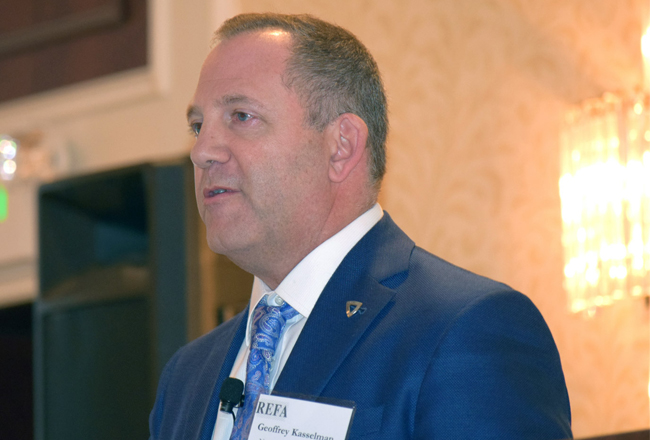Real estate futurist envisions 24-hour office buildings
Geoffrey Kasselman has seen the future and, in his opinion, the commercial real estate world needs to get ready for it in a hurry.

“Nothing is immune from the forces at work,” said Kasselman, an executive managing director of Newmark Knight Frank”™s National Industrial Practice based in Chicago, during his recent presentation in Stamford, “The Exponential Future of Everything,” sponsored by the Real Estate Finance Association of Connecticut. “Doing nothing is not an option. You need to get to the future ahead of your customers and be ready to greet them when they arrive.”
Kasselman, who recently completed a one-year term as global president of the Society of Industrial and Office Realtors, urged real estate professionals to be aware of emerging technologies and business trends that could reshape the industry in the next decade. Those include office properties where activity never ceases.
Today, “We talk about 100 percent occupancy in an office building that”™s occupied from 9 to 5,” he said. “I am here to tell you it is only occupied 33 percent of the time. What if you could build a building that could support three different eight-hour usages sequentially, 24/7/365? Can you imagine the revenue that property could get? Can you imagine the cap rate on that? Let”™s rethink occupancy.”
While office interiors might be abuzz with workers and self-driving vehicles could be ubiquitous on our highways, Kasselman said that commercial property rooftops could soon be the most desired space for another mode of transport.
“Do you know your air rights?” he asked. “You may want to consult with somebody on that fast; you may want to monetize it. There are a couple of companies that may rhyme with Zamazon and Zoogle that are trying to negotiate with large-portfolio commercial landlords now ”” they want a landing pad on the top of their buildings so they can recharge the drone on the top of their building so they can go on to the
next building.”
Kasselman, who is also founder and CEO of Op2mize Energy, a strategic energy procurement firm, predicted that microgrids in the near future will become integral to keeping properties powered. He also claimed that low-cost solar energy will become the dominant power source, while companies and countries that staked their economic well-being on oil will ultimately experience a reversal of fortune. “Our transition away from a petroleum-based economy is well underway,” he said.
For real estate brokers in the retail space, Kasselman urged them to focus on what he dubbed “DICE” clients: those offering differentiation, inspiration, community and experience to their customers, as opposed to a mere arrangement of products on shelves. “Those are the places that will have longevity,” he said. “If the place you go for retail doesn”™t have every single one of them, it will die. And we”™re already experiencing that.”
As for paying for goods and services in the near future, Kasselman is betting on cryptocurrency, noting that there are already 163 different cryptocurrencies on the market and both corporate and governmental entities are slowly venturing into that realm of finance. “The U.S. government is already working on it, as well as the European Union and other big governments,” he said.
Reeling off a list of other technology breakthroughs that will impact both real estate and the wider economy ”” most notably, artificial intelligence, blockchain, robotics and 3-D printing ”” Kasselman noted that cybersecurity attacks remained a major Achilles”™ heel for the high-tech future.
“Go back to your office and ask your CIO how many hack attacks occur every single day and be sure you are sitting down when you ask the question,” he said. “It could be thousands or millions every day that your CIO and his team are thwarting for you.”
Regarding the recent elimination of 2015 neutrality rules by the Federal Communications Commission, Kasselman said “It feels wrong. It feels like somebody took something away from us that we were entitled to, and that might prove to be the case. But it is all on how it is managed from here. The Federal Trade Commission and FCC are going to co-manage together, which I think is a good thing as opposed to putting it all in the hands of one of those government agencies.”